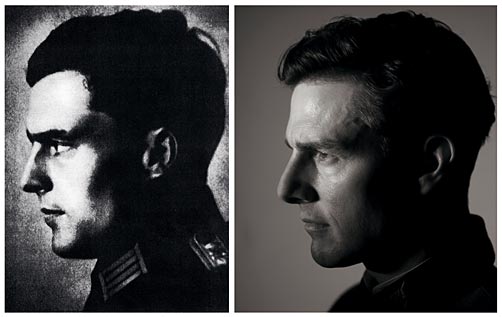
In mid-1944, the shadow of failed artist-turned-meglomaniacal psychopath Adolf Hitler still falls heavy across the continent, and, even as the Allies gather in North Africa, Italy, and the coast of Normandy, the Fuhrer maintains an iron grip over the oppressed peoples of Europe. As most everyone remembers from school days, Hitler was able to retain his power base in Germany, even amid the darkening gloom on both fronts, by ruthlessly organizing and consolidating the nation’s elite cadre of disgruntled character actors. Some of these character actors (Kenneth Cranham, Tom Hollander) rejoice in their servitude, and serve their Nazi master with an obsequious relish. Some of them (Tom Wilkinson, Thomas Kretschmann, Eddie Izzard) just look to keep their head down (for fear of losing it) and basically play go-along-to-get-along. But some character actors resisted. And as the likes of Kenneth Branagh, Bill Nighy, and Terrence Stamp see their various attempts to unseat Hitler fail due to bad luck, poor timing, or compromised plotters, it becomes abundantly clear what they need to achieve their goal of regime change: a lead actor.
Enter Tom Cruise, otherwise known as Count Claus von Stauffenberg, a Catholic aristocrat who’s been shipped off to the now-doomed North African front for his free-thinking transgressions. (The Fuhrer’s resident character actor in charge there is Bernard Hill, a.k.a. Theoden king, and he still can’t run a battle without timely lead actor advice.) Horribly wounded in an Allied bombing raid, Cruise/von Stauffenberg loses an eye, a hand, and several fingers, but — for his service (and his very reputable name) — gains access to the Fuhrer himself, after some machinations by the plotters. As such, leadership of the proposed coup eventually falls out of the hands of the character actor conspiracy and upon him. “I am involved in high treason with all means available to me,” he tells one aide at his job interview, “Can I count you in?” In other words, enough monologuing already! What Germany need now is emoting and stunt work.
If it seems I’m being a bit glib about a story that indirectly involves millions of deaths, untold destruction, and (tho’ it’s only obliquely mentioned at the beginning) systematic genocide, well I apologize. Along with the Titanic-type sensation of continually “waiting for the iceberg” throughout Valkyrie, it’s really hard to sit through the film without recollecting the ubiquitous and consistently funny Bruno Ganz in Downfall meme. (See also the Cowboys, Warcraft, Burning Man, eBay, Wikipedia, Ronaldo, Youtube, etc.) It could be worse, I suppose: For the many citizens out there who see Tom Cruise and now can’t stop thinking “Scientology,” I can safely report that he’s fine in the role — it helps that both he and his character both answer to a higher power (and have a touch of the zealot about them) — and that the accent problem is handled smoothly (a la Hunt for Red October.)
I should say, before this “review” degenerates any further into pop culture musings, that the real historical facts of this story are fascinating. The plotters of this assassination attempt aren’t really visionary idealists or radical bomb-throwers — Hitler had already rounded up or murdered most of them — but the conservative-leaning remnants of the military and aristocratic hierarchies displaced by the Nazi regime. (The 20 July plot is basically crafted by generals and led by Junkers.) And the engine of their coup attempt is ingenious: The plotters almost succeed in converting Operation Valkyrie, Hitler’s last-ditch plan to stay in power should the roof cave in, into the machinery of his demise. Finally, these German patriots get sooo close to their goal that, had any one of several tiny contingencies played out even slightly differently, the history of the war (and its aftermath) would have been irrevocably transformed. As happens surprisingly often, it seems, the fate of the world is a game of inches.
All that being said, I found all of this information equally fascinating while watching the History Channel special after the film, so I’m not sure it really recommends the movie itself in the end. Singer’s Valkyrie is a smart, well-meaning two hours of cinema, and I was reasonably edutained by it, but at best I’d say it’s one for the Netflix queue.

My fav is the Republican Downfall
My favorite is “Hitler finds out his subtitles are wrong”
“Everyone who preferred the dubbed version of Das Boot leave at once!”
Recursive and absurd, brilliant…
I, too, was generally pleased with this film, and think that criticism of casting Tom Cruise in the role is misguided. He did about as well as any non-German actor could have, and I agree with Kevin that viewer knowledge of his personal instability enhanced the character greatly. The man he was playing, von Stauffenberg, _should_ have a patina of insanity and even a touch of megalomania. His vendetta against Hitler was not as much about saving Germany in terms of its people and industry as much as it was about saving the ideal of “Deutschland” that he so strongly identified with and wanted to personify.